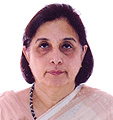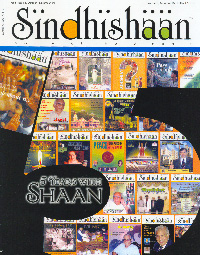![]()
TO BE A SINDHI
WHAT DOES IT MEAN TO ME?
By Dr. Subhadra Anand

I am a child born free – but I am also a child born out of a division. Yes, I am born in 1947 when the country became free – but when the land of my birth was snatched away from free India. No, I do not remember anything of Sindh. In fact my early life was spent in Delhi. My father, who was a Sessions judge in Karachi got re-located as Custodian, Evacuees Property in Delhi and went on to become Joint Secretary, Ministry of Law and subsequently Judicial Commissioner, Goa, Daman & Diu.
My earliest memory was of a host of relatives descending on us from Sindh and father having to erect huge tents in the sprawling garden of our government allotted house at Wellesley Road in Delhi to accommodate the exodus. The incessant and animated chatter of relatives in Sindhi was the first language my young ears head and that was how I picked up my mother tongue.
But father, a government servant somehow had always resented being referred as a 'Refugee' and gave strict instructions to all of us in our growing years to refrain from calling ourselves Sindhis. The maiden name of 'Jetley' helped in comflouging the Sindhi identity as we could easily pass off as Punjabis. In a cosmopolitan government colony since everyone spoke Hindi and English, mother tongues were relegated to the background.
But yet, the language of communication at home was Sindhi since mother could not speak English and had a broken knowledge of Hindi. But Sindhi identity was still a big blur as we hardly considered ourselves Sindhis.
After doing my schooling from Lady Irwin School, a Bengali School, I went on to Indraprastha College, for my graduation and onwards to the University of Delhi for my masters in History. Friends were made from all communities – Kashmiri, Punjabi, Maharashtrian, Tamil, U.P., Kayasth, Bengali, Oriya etc. but somehow no Sindhi found a place in the circle of friends. As a matter of fact, my future life partner was to be a non-Sindhi, a Punjabi from whom I have got my married name of 'Anand'.
But somehow at the corner of my being was my primordial identity of being a Sindhi. In my unconscious lurked the desire to explore my antecedents and heritage. The fact that I was raised on Sindhi Kadi, Koki, DalPakan, Sel Dabal, Sai Bhaji etc. contributed to my quest for this exploration. An inner voice drove me to my past and since I am historian I opted to do research on the Sindhi community. I had no idea how to go about it since there was no one in the Department of History in University of Mumbai who could guide me. I contacted Popati Hiranandani whose book, “Sindhis – a Scattered Treasure” had given me a starting direction towards my quest. Since Popati was not a recognized guide she recommended Dr. U. T. Thakur, a renowned sociologist and the writer of magnificent book “Sindhi Culture”. Dr. Thakur had retired from University of Mumbai and was settled in Udaipur. I wrote to him and he immediately asked me to come to Udaipur for discussion. I took the next flight and after meeting him I sealed my tryst with Sindhis to work for a Phd on the topic “National Integration of Sindhis”, a book that was later published by Vikas Publication. Never have I met anyone as genial and selfless as Dr. Thakur. His undying passion for Sindhi cause left me mesmerized. All vacations from College were spent in Udaipur seeking his guidance. He helped in tabulating the work I had done at Maharashtra Archives in Mumbai. Even though it took me 5 years to get my Phd, every minute was savoured by me as a delicious Sindhi dish. I soaked myself in all aspects of Sindhi ethos. In my book, I have traced the history of Sindh, the Partition period, the resettlement of Sindhis in free India, the socio – exchanges they underwent and finally a plan for the preservation of Sindhi identity (a dream of Dr. Thakur which I wasn't to implement).
I have been presenting lot of papers at national and international seminars on Sindhis and have tried educating the people on the problem of Sindhis. The highlight was a talk given to the senior faculty at Harvard University, U.S. on “Immigrant adjustments in host societies with special reference to Sindhis”. At St. Anthony's College, Oxford University U.K., I spoke on the “Changing Pattern of Sindhi Society in Post Partition India”. Both these talks were very well received and evoked great admiration for Sindhis and their enterprising spirit, but at the same time the threat to Sindhi identity registered with the audience. Back home at Indian Institute of Management, Ahmedabad, Indian History Congress at Mysore & Chennai and many other such conferences I forcefully brought forth the problem of Sindhis and was amazed, to see the positive response from all.
I was able to do all this work while I was a lecturer and Vice-Principal at R. D. National College, Bandra. However my commitment to Sindhi cause when I became the Principal of the College in the year 2000 slackened. Heavy administrative responsibility and work kept me away from my passion for Sindhis. But as a Principal, I have made Sindhi compulsory for Sindhi students in our Junior College. Besides a Certificate course in Sindhi, I have also introduced Sindhi as a second language in Std. XII and the first batch of Sindhi students appearing for the Board Examination did so well in the language that many more have been enrolled for it. Now there is no going back on Sindhi language in National College as the young generation of Sindhis are learning the language with great interest.
I am now due to retire as Principal at the end of the academic year and have very concrete plans for the Sindhi cause. This is because, to me, being a Sindhi means to bring about a unity amongst the scattered Sindhi community and to device a plausible plan for the preservation of Sindhi language, customs and identity. Sindhis must get their due place and recognition in society. I do intend to work in that direction because to me “It means a lot to be a Sindhi”.


